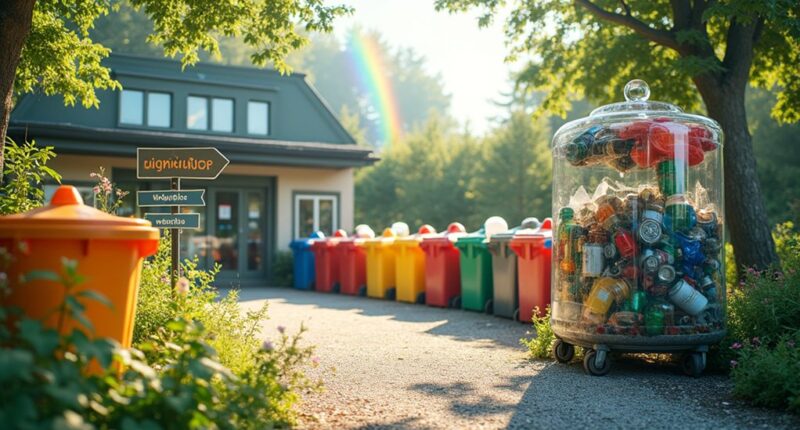In 2025, the UK is buzzing with a recycling revolution. Household recycling rates soared, hitting impressive new heights thanks to better waste management. Innovators are embracing sustainable packaging, making it harder to ignore the eco-friendly charm of compostable materials. Policies like mandatory food waste collections are turning the tide for greener practices. Meanwhile, the public is rallying behind consistent recycling systems, proving that a little enthusiasm can go a long way—stick around to discover how these changes reshape our green future.
Quick Overview
- The UK is targeting a 65% household recycling rate by 2026, aiming for significant improvements in waste management practices.
- Weekly food waste collections will be implemented for most households, enhancing organic waste recovery efforts.
- Public support for consistent recycling systems and extended producer responsibility is growing, indicating a shift toward better recycling practices.
- Companies are increasingly adopting sustainable and compostable packaging materials to reduce their environmental impact and improve recycling rates.
- Upgrades in sorting facilities and innovative approaches are addressing recycling challenges, promoting better material recovery across the UK.
Progress in Household and Packaging Recycling Rates
In the bustling arena of recycling, the UK has recently made strides that are both impressive and, let’s be honest, a tad sluggish.
The household recycling rate nudged up to 44.6% in 2023, thanks to better organic waste recovery—think of it as giving Mother Nature a helping hand. UK recycling rate increased from 44.1% in 2022, showing a positive trend. Districts categorized by recycling rates revealed significant regional disparities, with Wales leading at 57%, while England lags behind at 44%.
Packaging recycling remains pivotal, accounting for a hefty chunk of total waste.
Companies are increasingly adopting sustainable packaging options including biodegradable and compostable materials to reduce environmental impact.
With upgrades in sorting facilities, the UK is slowly but surely tackling the recycling conundrum, proving that every little bit helps—even if it’s moving at a snail’s pace.
Innovative Policy Initiatives and Market Drivers
How can the UK elevate its recycling game while also keeping businesses on their toes?
The government is rolling out standardized waste separation for all businesses with over ten employees, ensuring everyone knows their plastics from their paper. This initiative is part of a broader effort to reach a target of 65% recycling rates for households. Additionally, this standardized recycling system aims to improve the quality of recyclables and reduce contamination across the board.
Standardized waste separation for businesses ensures clear recycling practices, making it easier to distinguish plastics from paper.
By 2026, most households will enjoy weekly food waste collections, making composting as easy as pie. Plus, mandatory plastic film recycling will join the party by 2027. With a focus on reducing contamination, businesses are incentivized to step up their recycling efforts. Embracing conscious consumption habits can significantly reduce the amount of waste generated in the first place.
These policies not only support the circular economy but also create opportunities for innovative waste management solutions. It’s a win-win!
Transformative Public Attitudes and Emerging Trends
What if the key to a greener future lies not just in policies but also in the collective mindset of the public?
In 2025, 89% of UK citizens regularly recycle, revealing a societal shift. However, confidence in recycling practices is low, with only 9% feeling “very confident” about recyclable materials. Frustration brews as 81% admit to tossing non-recyclables in the wrong bin. Yet, optimism shines through; 87-89% would embrace reuse models. With a strong desire for a consistent recycling system, the public’s evolving attitudes could transform the recycling landscape—if only they could decipher those pesky labels! Recent polls indicate that 70% of respondents back extended producer responsibility (EPR) for materials like aluminium, highlighting the public’s commitment to better recycling practices. Additionally, 71% agree that a consistent recycling collection system would significantly boost recycling rates. The growing attention to U.S. state regulations is influencing UK packaging strategies as companies adopt sustainable approaches that comply with international EPR legislation.









